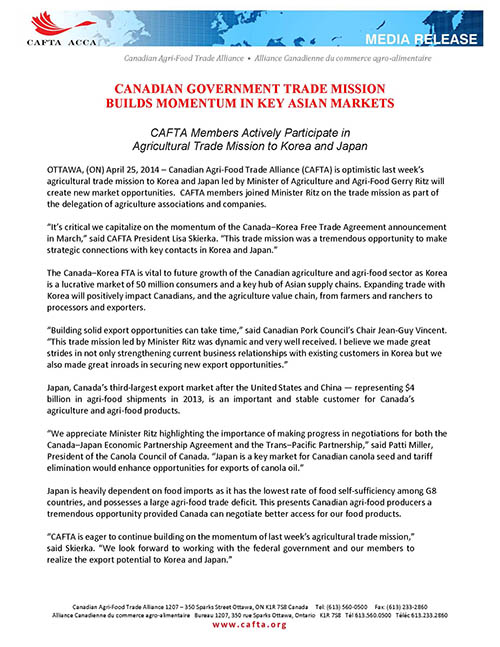OTTAWA, (ON) April 25, 2014
C ANADIAN GOVERNMENT TRADE MISSION BUILDS MOMENTUM IN KEY ASIAN MARKETS
ANADIAN GOVERNMENT TRADE MISSION BUILDS MOMENTUM IN KEY ASIAN MARKETS
Canadian Agri-Food Trade Alliance (CAFTA) is optimistic last week’s agricultural trade mission to Korea and Japan led by Minister of Agriculture and Agri-Food Gerry Ritz will create new market opportunities. CAFTA members joined Minister Ritz on the trade mission as part of the delegation of agriculture associations and companies.
“It’s critical we capitalize on the momentum of the Canada–Korea Free Trade Agreement announcement in March,” said CAFTA President Lisa Skierka. “This trade mission was a tremendous opportunity to make strategic connections with key contacts in Korea and Japan.”
The Canada–Korea FTA is vital to future growth of the Canadian agriculture and agri-food sector as Korea is a lucrative market of 50 million consumers and a key hub of Asian supply chains. Expanding trade with Korea will positively impact Canadians, and the agriculture value chain, from farmers and ranchers to processors and exporters.
“Building solid export opportunities can take time,” said Canadian Pork Council’s Chair Jean-Guy Vincent. “This trade mission led by Minister Ritz was dynamic and very well received. I believe we made great strides in not only strengthening current business relationships with existing customers in Korea but we also made great inroads in securing new export opportunities.”
Japan, Canada’s third-largest export market after the United States and China — representing $4 billion in agri-food shipments in 2013, is an important and stable customer for Canada’s agriculture and agri-food products.
“We appreciate Minister Ritz highlighting the importance of making progress in negotiations for both the Canada–Japan Economic Partnership Agreement and the Trans–Pacific Partnership,” said Patti Miller, President of the Canola Council of Canada. “Japan is a key market for Canadian canola seed and tariff elimination would enhance opportunities for exports of canola oil.”
Japan is heavily dependent on food imports as it has the lowest rate of food self-sufficiency among G8 countries, and possesses a large agri-food trade deficit. This presents Canadian agri-food producers a tremendous opportunity provided Canada can negotiate better access for our food products.
“CAFTA is eager to continue building on the momentum of last week’s agricultural trade mission,” said Skierka. “We look forward to working with the federal government and our members to realize the export potential to Korea and Japan.”





